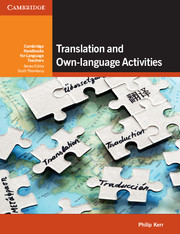Book contents
1 - A seminar for teacher training courses (pre-service)
Published online by Cambridge University Press: 15 November 2023
Summary
Procedure
1 Put trainees into small groups. Ask them to discuss their own language learning experiences. Write the following questions on the board to guide the discussion.
• How much did your teachers use your language in class? For what purposes?
• How often did you, as a learner, translate from and into the target language?
• Do you think you might have learned more quickly if your teacher had used more or less of your own language?
2 Draw trainees’ attention to the advertisement in Handout A. Highlight the phrase Only English spoken in class. Ask the trainees why they think the school has decided to focus on this in their advertisement. Put trainees into groups and ask them to brainstorm as many reasons as possible for why an English-only policy might be considered to be a good thing.
3 When trainees have had enough time to brainstorm their ideas (five minutes is probably sufficient), elicit their ideas and make a list on the board. You may also wish to add to the list yourself. Do not, at this stage, get into a discussion about the rights and wrongs of these reasons.
4 Distribute Handout B. Ask trainees to compare the notes on the board with the points on the handout. Ask them to identify any points that were not listed on the board. A few minutes should be sufficient for this. Conduct feedback with the whole group.
Handout B
A The most powerful reason for an English-only policy in a language school is commercial. It seems that most people (i.e. customers) believe that a native-speaker teacher who uses only English makes the best teacher. Of course, it is possible that the native-speaker teacher is unable to speak the language of the students and is, therefore, necessarily restricted to English only.
B Apart from the point above, the most commonly quoted reason for adopting an English-only policy is that any time spent speaking the students’ own language is time that could have been spent speaking English. English-only therefore equals maximum opportunities for speaking English.
C It is often said that language learners need to learn to think in the target language. Permitting the use of the student's own language discourages them from, and makes it harder to start, doing so.
- Type
- Chapter
- Information
- Translation and Own-language Activities , pp. 147 - 150Publisher: Cambridge University PressPrint publication year: 2014



